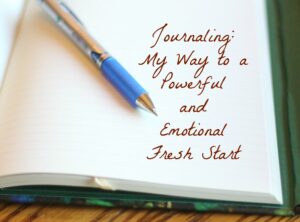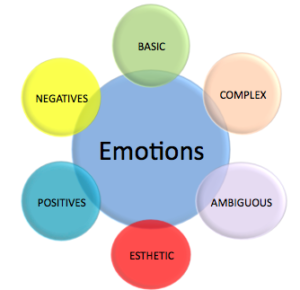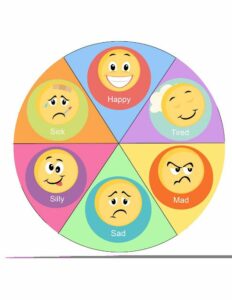Contents
Journaling Emotions
 Journaling is a great way to understand your emotions better. When you journal emotions, you can write out how you feel or even draw or collage the feelings that you are having trouble understanding until you can gain a better understanding of yourself and why you are feeling that way. In addition, journaling is especially helpful for those dealing with mental illness or disorders such as anxiety, depression, or PTSD which will allow them to track their progress, set goals and reflect on their accomplishments. Journaling can also be a helpful tool for self-care. Allowing you to release some of the tension or anxiety that you may be feeling will help to improve your mental state. So, if you are looking for a way to understand your emotions better, journaling is a great option.
Journaling is a great way to understand your emotions better. When you journal emotions, you can write out how you feel or even draw or collage the feelings that you are having trouble understanding until you can gain a better understanding of yourself and why you are feeling that way. In addition, journaling is especially helpful for those dealing with mental illness or disorders such as anxiety, depression, or PTSD which will allow them to track their progress, set goals and reflect on their accomplishments. Journaling can also be a helpful tool for self-care. Allowing you to release some of the tension or anxiety that you may be feeling will help to improve your mental state. So, if you are looking for a way to understand your emotions better, journaling is a great option.
Why And How To Journal?
Journaling can also serve as a great way to work through difficult emotions and issues. Getting things off your chest by journaling about it can help you gain a sense of closure. You can write out how you feel or even draw or collage the feelings that you are having trouble understanding or working through until you can gain a better understanding of yourself and why you are feeling that way.
- Journaling can help you understand your emotions better.
- Journaling is a great way to learn more about your emotions, and what triggers certain reactions from you.
- Keeping a journal can help identify patterns and causes that lead to certain states of emotion and then seek to eliminate or manage the causes accordingly.
- Journaling also provides a safe space for self-reflection and improvement which will allow you to grow as an individual.
When journaling, it is important to be specific. Don’t just write “I feel sad today.” Dig a little deeper and figure out why you are feeling that way. Is there a particular event that happened that made you feel this way? Or are you feeling down for no reason at all? Once you have pinpointed the event or reason you can seek to eliminate or manage it. If the cause seems like something that is either not possible to change (an incident occurred) or difficult to resolve (you’re feeling down for no reason), then journaling about how you are feeling will help you better understand yourself and your emotions, which will allow you to grow as an individual.
How To Journal Emotions Successfully?
 There are many different ways that you can journal. However, the most common and widely used method of writing in a journal is simply by hand. You can choose to write with pen and paper or you may decide to type on your computer instead. Another popular way to keep your thoughts and emotions organized is through the use of an electronic journal or “blog” where you can easily keep track of your entries. Whichever way you decide to journal, there are a few key things to remember in order to make the process successful:
There are many different ways that you can journal. However, the most common and widely used method of writing in a journal is simply by hand. You can choose to write with pen and paper or you may decide to type on your computer instead. Another popular way to keep your thoughts and emotions organized is through the use of an electronic journal or “blog” where you can easily keep track of your entries. Whichever way you decide to journal, there are a few key things to remember in order to make the process successful:
1. Find a time and place that is conducive to writing. This may be early in the morning before the rest of the house wakes up, during your lunch break at work, or right before bed. Find a time when you will be able to sit down and write without interruption for a set amount of time.
2. Make it a habit. Just like anything else in life, journaling takes practice in order for it to be successful. Set yourself a goal of one journal entry per day that you try to uphold for at least 30 days or until it becomes a habit.
3. Write whatever comes to mind without editing your thoughts too much. This will allow you to remain more in touch with your emotions and feelings throughout the process while paving the way for new insights into yourself and your thoughts.
4. Later on, go back and read what you wrote. This will allow you to better understand yourself and why you are feeling the way that you do in certain situations. It may even help you come up with resolutions or strategies for how to improve your life and mental state in order to remain happy and healthy overall.
Benefits Of Journaling

Journaling is an amazing way to process your thoughts, emotions, and experiences throughout the day.
- The benefits of journaling are vast ranging from improved mental health to better insight into yourself and the events that occur in your life.
- If you are looking for a way to track your moods, progress on mental health goals, or simply want a place to vent and express your thoughts and feelings, journaling is the perfect option.
- Journaling can be especially helpful for those who suffer from mental illness, emotional distress, or disorders such as anxiety, depression, PTSD, etc.
- It is important to remember to take care of oneself when dealing with any type of mental disorder so journaling is an extremely helpful tool for self-care.
- It allows you to track your progress, set goals for yourself and reflect on your accomplishments.
- Writing out your thoughts and feelings can also help to release some of the tension or anxiety that you may be feeling which will help to improve your mental state.
So, if you are looking for a way to improve your life in some way, start journaling today. The benefits are definitely worth it.
Journaling Exercises to help with emotions
Journaling exercises to help with emotions are written for people who are having a hard time with their emotions or need some extra help in managing them. Writing/journaling is not just about reflecting on your thoughts. It’s also about deciphering how you are feeling and what events have caused those feelings. It can be used as a tool to notice patterns in your moods, the types of situations that trigger feelings or even to gain insight into why you are feeling down.
Distancing Yourself from Your Emotions

The first journaling exercise is all about distancing yourself from your emotions. This can be helpful in gaining some perspective on the events that have occurred and how you are feeling about them.
1. Write down the event or situation that has caused you to feel emotional.
2. Next, write down how you are feeling about the event. Be descriptive and use as many words as necessary to fully explain the emotions you are having.
3. Finally, write down why you are feeling the way that you do about the situation or event mentioned in step 1. Think about what has happened in your past with similar experiences or think about how this may be affecting other areas of your life such as your relationships or work life.
By using this journaling exercise, you can gain better insight into why you are feeling the way that you do and what triggers those feelings.
Triggers and Solutions Journaling Exercise
Triggers and solutions journaling is a good option for learning about our emotions and figuring out why we react the way we do. It can also be helpful in identifying potential solutions to our problems.
Defining Your Emotions
 An important step in journaling is defining the emotions that you are feeling.
An important step in journaling is defining the emotions that you are feeling.
- ” How do I know when I am angry?”
- “What type of situations make me feel disappointed?”
- “What are some words that represent the way that I am feeling right now?”
The more specific you can be with your definitions, the better off you will be when writing your thoughts and feelings about an event or situation.
1) List all of the feelings that you have experienced for the day so far.
2) Write down why you think these feelings were triggered. This may be something that happened to you, something that someone said or did, or it may just be a general mood that has been present throughout your day.
3) Write down some solutions to the situations that you analyzed in step two that will help you to feel calmer or happier about what is going on. This may be something that you implement right away or it may take some time to think of an appropriate solution. The key is setting goals and thinking of ways to improve your current situation.
4) Repeat this exercise for other days that you are feeling emotional or overwhelmed. It can be very helpful to think about past experiences and the emotions that they solicited.
This exercise can be used to deal with any type of emotion, whether it is happiness, sadness, anger, or any other feeling.
Setting Better Boundaries
Boundaries for parents with kids who have mental health issues or disabilities-what you need to know about this topic, including how to talk about it with your child’s school or other caregivers, what types of services may be available, and the importance of giving your child choices when they’re able-including letting them say “no” sometimes
Setting healthy personal limits on social media use -why this is important, how you can do it without feeling guilty or like a failure, and tips for sticking to your limits
The Emotional Wheel
 The emotional wheel can be a helpful way of visualizing the different emotions that we experience. It can also help us to see how those emotions are interconnected.
The emotional wheel can be a helpful way of visualizing the different emotions that we experience. It can also help us to see how those emotions are interconnected.
1) Draw or find a picture of an emotional wheel online.
2) Label the different emotions that are represented on the wheel.
3) Notice how emotions are interconnected. For example, if you are feeling angry, you may also feel frustrated, overwhelmed, or sad.
4) Consider how each of these emotions has an impact on your day-to-day life.
5) Think about ways that you can reduce the intensity of some of your emotions, such as practicing deep breathing or looking at a situation from a different perspective.
The ABCs of Emotions
The ABCs of emotions is another way of visualizing how our emotions work.
1) Label the different emotions that are represented on the wheel.
2) Notice how each emotion has an effect on our thoughts, feelings, and behavior.
3) Consider ways that you can change your thoughts, feelings, and behaviors to better react to different situations.
4) This exercise can be repeated each morning, afternoon, and night if you like. It can be really helpful in changing your perspective on different life events or emotions that you are feeling.
The 4 Questions of Emotion
The four questions of emotion are another effective tool for determining your emotions and the root of those emotions.
1) What am I feeling? How intense is this feeling on a scale from 1-10?
2) Where in my body do I feel this emotion?
3) When did this feeling start? Was there a specific event that happened or a thought that triggered this emotion?
4) What is the meaning of this emotion to me? Why am I feeling this way?
Conclusion
Journaling emotions is a helpful way to identify the different feelings that you are feeling and why they’re happening. The Emotional Wheel, ABCs of Emotions, 4 Questions of Emotion can be used as tools for determining your emotional state throughout the day. If journaling doesn’t work well for you or if you want more advice on how to manage certain types of emotions in order to live a happier life, reach out! Our team would love to help create an action plan with concrete steps towards living a healthier lifestyle by better understanding what makes us happy – both inside and outside our bodies.
If you are looking for affordable Online Counseling MantraCare can help: Book a trial therapy session


